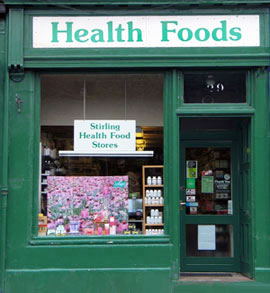Our Green Credentials
What do we do to minimize our impact on the environment?
We at the Stirling Health Food Store realize how important it is to protect our environment.
After all, nature provides us with food, water, air to breathe, shelter and basically everything we need to survive.
So, what do we do to minimize our impact on our lovely planet?
- Plant based plastic packaging
We don't refill beans and pulses etc, because it would mean that you would lose 50% of choice of products due to refill stations being pretty large.
BUT:
ALL 'plastic' green Just Natural prepacks are made from home compostable plastic. This plastic (the ink as well) is 100% plant based and will decompose easily in your compost heap. You can also put it in your green recycling bin, but to prevent it from being rejected, it may be best to 'hide' it in amongst the rest. - Cruelty free Skincare
Our entire range of skincare and personal care products has not been tested on animals and neither have the ingredients used. Choose from Faith in Nature, Weleda, Jason, Organica J and much more. - Reduce - Reuse - Recycle
We have a policy of not buying stuff we don't need and for the stuff we do need (like paper and printer ink) we choose greener options like paper made from recycled materials and whenever available we choose refilled ink cartridges.
We also reuse as much as we can: smaller cardboard boxes are being reused for posting out online orders and some larger ones are being reused on my vegetable plots!
Paper packaging is being reused as wrapping for our soaps in store or as filling in boxes.
We even reuse unwanted bubble wrap envelopes and other packaging chips from our local community for posting out online orders. We also print unofficial documents on paper destined for the bin, to save paper.
We recycle all the cardboard and paper we cannot reuse.
I even take home the tea bags we used ourselves to add to my own compost heap! - Lights in our shop
The lights which illuminates our shop are LED, which uses less electricity than standard lights. - Organic food
The vast majority of foods we sell comes from organic farming.
Organic farming is a method of farming which uses environmentally friendly methods for weeds, pest and disease control thus leaving no harmful pesticides or artificial fertilisers in the soil, water ways and air. Because of this, organic farms create a higher biodiversity (meaning more different insects, birds and other animals) than non-organic farms. Organic foods also contain much less residue of toxic chemicals than non-organic foods, so better for you and better for the planet. - Promoting Green Gardening
As a gardener myself, I try to inspire others to garden in an environmentally friendly way by writing a monthly newsletter which features my 'garden & chicken blog' and by building/maintaining a website dedicated to greener living which you can find here: www.circleofgoodlife.co.uk
You can sign up for our monthly newsletter by clicking here
TOGETHER WE CAN MAKE IT WORK
